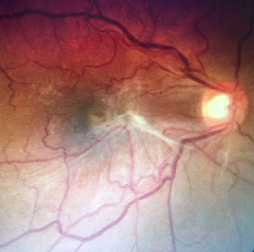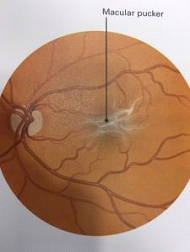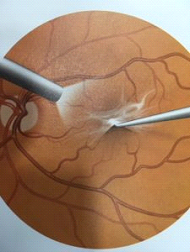What is a macular pucker?
Macular pucker happens when wrinkles, creases or bulges form on your macula, the central part of the retina. The macula is the central part of the retina that allows you to read and see fine details. With macular pucker, things can look wavy, or you may begin having trouble seeing details. You might notice a gray or cloudy area in your central vision. You may even have a blank spot in your central vision. Macular pucker will not affect your peripheral vision.

What causes macular pucker?
Age is the most common cause of macular pucker. As you get older, the vitreous begins to shrink and pull away from the retina. Usually the vitreous pulls away with no problems. But sometimes some of the vitreous can stick to the central retina. This allows glial cells from the retina to grow over top the retina and induce formation of a macular pucker. The incidence of occurring in both eyes is ~10-20%. This condition can occur at any age, but more often occurs in patients over the age of 50.

Who is at risk for macular pucker?
Aging is the most common risk factor for macular pucker. People who have other eye problems may also get a macular pucker. These problems include:
· Vitreous detachment
· Torn or detached retina
· Eye trauma
· Ocular inflammation
· Prior eye surgery
· Problems with blood vessels in the retina
How is macular pucker diagnosed?
A macular pucker is diagnosed by your ophthalmologist during a dilated eye exam and can be further evaluated with special tests like optical coherence tomography (OCT) or fluorescein angiogram.
How is macular pucker treated?
In most cases, the symptoms are mild and surgical treatment is not required. Changing your eyeglasses prescription can help improve vision. Eye drops, medicine and laser surgery do not help vision if you have macular pucker.
If your symptoms are significantly affecting your vision, you will require surgery called vitrectomy to repair the problem. The Retina surgeon will remove the
vitreous and gently peel the membrane from the surface of the macula. This will allow the retina to flatten over time and return to its normal proper position. It is likely your vision will slowly improve. Surgery improves your chances of eliminating the decreased, distorted or wavy vision. It may take weeks, months or even years after the surgery to see visual improvement, dependent on the duration of the problem and severity.
What are vitrectomy surgery risks?
· Retinal detachment
· Eye Infection
· Cataract formation or progression
· Loss of vision
Discuss the risks with your doctor prior to surgery.




